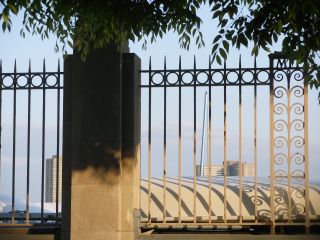September 15, 2006
Arab Reflections

Marc Lynch, an associate professor of political science at Williams, and proprietor of the blog Abu Aardvark surveyed the Arab press on the fifth anniversary of 9/11 in his piece "Arab reflections on the Anniversary of 9/11"
I'm struck by the level of consensus over how bad things are five years after 9/11. I looked at more than a dozen newspapers from eight Arab countries (along with the three London-based pan-Arab dailies), whose columnists generally range from extreme anti-Americans to partisan pro-Americans. I could find only a handful of columnists arguing that the war on terror has made things better for the United States, its ideas, or its allies (they mainly vary on whether they see all this as a good or a bad thing). Whether writing in opposition to America or in support of it, Arab columnists seem pretty unanimously to see Islamist extremism on the rise, democracy in retreat, and American influence in tatters. They almost universally blame Bush for making things worse than they had to be, and particularly identify the invasion of Iraq as the key mistake, the point where things all went wrong. That all might be self-serving and hypocritcal, insightful and brilliantly observed, or whatever. But it is what's being written and said, for the most part.
Would that the US press would reach the same conclusions.
This morning I also heard an interview on NPR with Moazzam Begg one of the nine British Islamists who were held by the US, (released in 2005), author of "Enemy Combatant: My Imprisonment at Guantanamo, Bagram and Kandahar", which documents the torture this thoughtful man suffered in prisons operated under the auspices of the US government. In spite of ongoing US accusations, he is hard to demonize.
On September 14, he wrote an editorial in the Boston Globe about being asked to be a defense witness in the case against PFC Damien Corsetti for detainee abuse. Here are some of his words, just in case the Globe erases them on line.
The then specialist, Damien Corsetti , didn't mistreat me. He never interrogated me and he always passed by my cage with a smile, often stopping to talk. He even gave me reading books at a time when they were hard to come by. One of the books, ironically, Heller's ``Catch-22," is described as ``the classic antiwar novel of our time." I was even allowed to bring it with me to England, where it remains on my bookshelf, next to another book from US soldiers: a military issue of the Bible, in full camouflage jacket.I often found myself discussing religion with guards and interrogators, some of whom were Christian Evangelists or Southern Baptists. I thought it important to try to explain similarities between the Bible and the Koran , as well as looking at the fundamental differences in belief and perception. Perhaps, I thought, it might help some of my captors appreciate that we all held things sacred.
Last year, when Newsweek published a report alleging the desecration of the Koran by guards in Guantanamo, I was surprised -- surprised that the article had materialized so late. Many former prisoners had complained about the abuse well before, including me. However, my personal analysis of the affair was simple: the Koran may be the sacred, unadulterated speech of the Almighty to me and 1.6 billion other Muslims, but to the average soldier it is paper and ink. If, in his or her mind, it was justified to redefine the rules of engagement to include the application of torture then what of a mere book?
One cannot help but admire a man who retains such empathy and a sense of justice, in spite of his unconscionable treatment at the hands of our government.
Unspeakable acts are being carried out by the Bush administration in the name of democracy, and he only wants permission to carry out more. We have alienated the entire world, created rage, fueled impulses for retaliation, killed thousands (both ours and theirs) ruined the lives, bodies, homes and businesses of hundreds of thousands more, and Bush continues his relentless pursuit of " the enemy". The Emperor may have no clothes, but he has an addiction to power that will never be satisfied, and must be stopped.
Photo note: Kind of an Arabic flavor for a Boston shot with a bonus for bars. The best I could do from my archive, which is short on pictures of instruments of torture, so far.
Addendum: Dan Froomkin's edifying piece on Bush, congress and torture
Posted by Dakota at September 15, 2006 07:26 AM